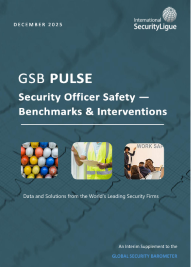
Key Points
- Many skilled security professionals are sidelined by protracted licensing processes, leaving security firms unable to fill crucial positions and compromising public and business safety.
- The intended benefits of security officer licensing are undermined by slow, inefficient bureaucracies and misguided policies that extend processing times for new applications and renewals, causing significant financial and professional setbacks for applicants.
- Industry leaders and experts are urging governments to modernize licensing systems—through digitization, increased staffing, and interim licensing measures—to boost employment opportunities and ensure a robust, adequately staffed security sector.
Many talented and qualified security professionals are ready to go to work for security firms eager to deploy them but are being sidelined by delays in processing security officer license applications, according to a review by the International Security Ligue. Beyond harm endured by the individuals prevented from working, the security of businesses and the public is being put at risk from needed security posts going unfilled.
The laudable intention of security professional licensing—to ensure a minimum level of vetting of individuals providing security services—is being undermined by slow bureaucracies and misguided policies. It has real consequences for the individuals who are ready and able to fill security posts but are left waiting (and waiting) for applications to be processed.
“It is absolutely monstrous what I’ve seen, how people are affected by this," said private security professional Zachary Young in an interview with CBS6 in Viriginia, USA, which reported on extended delays in the issuing of state licenses, exacerbated by a change in its online credentialing system.
Young, who spent hundreds of dollars to complete courses required to obtain a license, said the delay prevents him from working because prospective employers are unable to verify his credentials. Security companies say delays are causing staffing shortages and making it hard to hire new employees, with some officers being removed from shifts because workers’ expired licenses are not being renewed.
“Two weeks turned into a month, turned into two months, and now we're on month four, and nothing's been done about it," Young told CBS6. “It's been a huge setback, especially because it's just money I threw into a hole and lit on fire at this point."
Zachery Young’s ordeal is not unique to the state of Virginia or the United States. The exact scale of the problem is hard to know, as data on application processing times is not always collected and typically not publicly available, but analysis of online forums around the world indicate the problem is not rare.
“Is anyone else being affected by the extreme delays in security licence renewal processing times?” asked a security professional a few months ago on a sub reddit about Canberra and the Canberra region of Australia. “The timeframes have blown out to 6+ weeks for renewals and more than 6 months for new applications. Security companies are struggling to fill guarding shifts and guards that are waiting can't work, and aren't paid, because it's illegal to work without a current licence.”
I've been waiting 8 weeks so far for a security license application to be approved. I live in South Australia. I sent consumer business services an email in regards last Friday so just waiting on a response. It's kind of had me in limbo workwise as I haven't been able to take on work as I don't know how long until it's approved. — Tolff00, 2024 Reddit thread titled, “Security licence processing times causing guard shortages"
Moving Toward Faster Licensing of Security Professionals and Greater Public Safety
With a global median rating of 61.3 on a 1 (poor) to 100 (excellent) scale, the 2025 Global Security Barometer (GSB) survey discovered substantial concern about the current state of regulation and licensing, including bureaucratic logjams that hurt the ability of quality security firms to meet demand for services. The results are a strong reminder from the world’s leading security executives that nations still have much work to do to remove regulatory and bureaucratic barriers to security excellence.
Steve Amitay, Executive Director and General Counsel at the National Association of Security Companies (NASCO) and a contributor to the 2025 GSB, says delays in the U.S. are creating security personnel shortages and deterring people who would be good security officers, such as military veterans, from entering the profession because they can’t afford the long wait before earning an income.
When security licensing is not done in an efficient manner, everyone loses: the person seeking to become a private security professional, security companies seeking to meet their clients’ security needs, entities seeking to provide adequate security for their employees and customers, and the public in general.” — Steve Amitay, Exec. Dir., NASCO, 2025 GSB
Governmental entities must take action to facilitate faster security professional licensing, according to Amitay, including allocating more personnel to process applications, modernizing and digitizing the application and fingerprinting processes, and providing for temporary licenses or temporary work authorizations for security professionals who have received training and undergone a background check but are waiting for their official “guard card.”
Governments should also review existing regulations with an eye toward eliminating outdated or unnecessary requirements. For example, in its review for the Connecticut Legislature several years ago, a task force concluded that multiple inefficiencies existed in the state’s regulations, such as a firearms course requirement for veterans—even when they possess valid and relevant military weapons qualifications (Task Force to Study the Use of MOS Specialty Training as a Substitute for State Licensing Requirements, Jan. 2014).
With immigration growing and security companies recruiting more security guards with a foreign background than ever before, governments may also need to review and improve how they are currently addressing language requirements and the speed at which they can conduct international background checks.
Where they exist, governments might also re-visit policies under which they revoke or suspend professional licenses because of unpaid tax debt. In every state in the U.S. and the District of Columbia, an individual who owes a debt to the state can lose their license to work, notes a study to be published in an upcoming edition of the Minnesota Law Review (“Debt, Work, and the State,” April 16, 2024). The study observes that “without the ability to make a living, it is much harder to pay off debt,” characterizing the use of occupational license restrictions as a debt collection tool both “ironic and nonsensical,” as it drives people facing financial difficulty into even deeper hardship.
A Dec. 2023 report by the Center for Public Integrity in the U.S. put a face to that policy, profiling security officer Brad Keller, who repeatedly tried to find out how much he owed in state taxes but received seven letters from state agencies, each citing different debt amounts (“State tax collectors push struggling people deeper into hardship,” Dec. 13, 2023). “But perhaps the most bewildering part was the one thing the state was clear about: If he didn’t pay up quickly, the state would yank his license to work as a security guard,” the report reads.
Keller said he recalls telling an agency representative, “If I can’t work, I won’t be able to pay you,” but was told, ‘I don’t care. We’re going to suspend your license.’” Ultimately, that is exactly what they did.
Fast, Efficient Licensing is Good For All
Governments may reflexively resist revamping professional licensing bureaucracies, and especially recoil at spending more on people or technology to speed the processing of applications. They should realize, however, that the status quo may come at a cost.
“When State residents are not working while waiting for a state license, these idle workers cost the state revenue in both unemployment insurance payments and loss of income tax,” according to a NASCO position paper on licensing in the U.S. (“The Serious Economic and Public Safety Effects Due to Delays in State Security Professional Licensing,” February 2024). Additionally, “Shortages of private security professionals cause businesses and other entities to decrease their operational hours and/or delay or cancel expansion. This in turn impedes local economic and job growth and lessens sales and tax revenue to the State.”
Many remedies are straightforward and can easily gain consensus support but can go unimplemented if regulators fail to see the pressing need for change. Amitay suggests that governments must recognize speedier application approvals for the win-win it is.
“Around the world, the private security industry offers individuals employment in a growing, stable occupation, with long-term employment and career opportunities” he writes in GSB 2025. “Governmental entities must realize that faster licensing will not only increase employment for their residents and increase income and business tax revenue for them, but it will also enable security companies to meet the growing public and private demand for security.”






